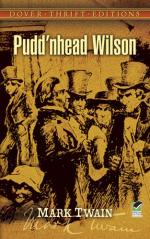John Smith, right hand—
and add the day of the month and the year, then take Smith’s left hand on another glass strip, and add name and date and the words “left hand.” The strips were now returned to the grooved box, and took their place among what Wilson called his “records.”
He often studied his records, examining and poring over them with absorbing interest until far into the night; but what he found there—if he found anything—he revealed to no one. Sometimes he copied on paper the involved and delicate pattern left by the ball of the finger, and then vastly enlarged it with a pantograph so that he could examine its web of curving lines with ease and convenience.
One sweltering afternoon—it was the first day of July, 1830—he was at work over a set of tangled account books in his workroom, which looked westward over a stretch of vacant lots, when a conversation outside disturbed him. It was carried on in yells, which showed that the people engaged in it were not close together.
“Say, Roxy, how does yo’ baby come on?” This from the distant voice.
“Fust-rate. How does you come on, Jasper?” This yell was from close by.
“Oh, I’s middlin’; hain’t got noth’n’ to complain of, I’s gwine to come a-court’n you bimeby, Roxy.”
“You is, you black mud cat! Yah—yah—yah! I got somep’n’ better to do den ‘sociat’n’ wid niggers as black as you is. Is ole Miss Cooper’s Nancy done give you de mitten?” Roxy followed this sally with another discharge of carefree laughter.
“You’s jealous, Roxy, dat’s what’s de matter wid you, you hussy—yah—yah—yah! Dat’s de time I got you!”
“Oh, yes, you got me, hain’t you. ‘Clah to goodness if dat conceit o’ yo’n strikes in, Jasper, it gwine to kill you sho’. If you b’longed to me, I’d sell you down de river ‘fo’ you git too fur gone. Fust time I runs acrost yo’ marster, I’s gwine to tell him so.”
This idle and aimless jabber went on and on, both parties enjoying the friendly duel and each well satisfied with his own share of the wit exchanged—for wit they considered it.
Wilson stepped to the window to observe the combatants; he could not work while their chatter continued. Over in the vacant lots was Jasper, young, coal black, and of magnificent build, sitting on a wheelbarrow in the pelting sun—at work, supposably, whereas he was in fact only preparing for it by taking an hour’s rest before beginning. In front of Wilson’s porch stood Roxy, with a local handmade




